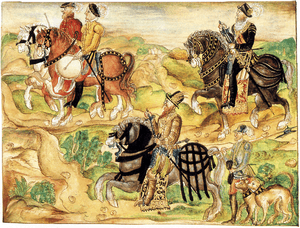Welser

Welser was a German banking and merchant family, originally a patrician family from Augsburg, that rose to great prominence in international high finance in the 16th century as financiers of Charles V, Holy Roman Emperor. Along with the Fugger family, the Welser family controlled large sectors of the European economy, and accumulated enormous wealth through trade and the German colonization of the Americas. The family received colonial rights of the Province of Venezuela from the Charles I King of Spain in 1528, becoming owners and rulers of the South American colony of Klein-Venedig (within modern Venezuela), but were deprived of their rule in 1556. Philippine Welser (1527–1580), famed for both her learning and her beauty, was married to Archduke Ferdinand, Emperor Ferdinand I's son.[1][2]
Claiming descent from the Byzantine general Belisarius, the family is known since the 13th century. By the early Age of Discovery, the Welser family had established trading posts in Antwerp, Lyon, Madrid, Nuremberg, Sevilla, Lisbon, Venice, Rome and Santo Domingo. The Welsers financed not only the Emperor, but also other European monarchs.
History

The history of the family can be traced back to the 13th century. Later its members became widely known as prominent merchants. In the 15th and 16th centuries, branches of the family settled at Nuremberg and in Austria, respectively.
The Venezuela purchase



Bartholomeus V. Welser lent the Emperor Charles V a great sum of money for which in 1528 he received as security the Province of Venezuela, developing it as Klein-Venedig (little Venice) but in consequence of their rapacious acts the Welsers were deprived of their rule before the Emperor's reign was over. His son, Bartholomeus VI. Welser, explored Venezuela and was executed by local Spanish Governor Juan de Carvajal in 1546.
Habsburg marriage
Bartholomäus's niece, Philippine (1527–80), daughter of Franz Welser, renowned for her learning and beauty, secretly married the Archduke Ferdinand, second son of the Emperor Ferdinand I. She was given the titles Baroness of Zinnenburg, Margravine of Burgau, Landgravine of Nellenburg and Countess of Oberhohenberg and Niederhohenberg. Their children were debarred from inheriting their father's rank as Archdukes of Austria; their son Margrave Andrew of Burgau became a cardinal and Charles, Margrave of Burgau became a noted General.
Other members
Another member of the Welser family, Markus Welser (1558–1614), became famous for his learning. He was a humanist, historian, publisher and from 1611 Bürgermeister of Augsburg.
Carl Wilhelm Welser von Neunhof (1663–1711) was a mayor of Nuremberg.
Branches and nobility
Bartholomeus V. Welser was ennobled by the Emperor in 1532. The Augsburg main line became extinct in 1797, the Nuremberg branch in 1878. The Ulm branch, which became Imperial Barons in 1713, still exists. The Welsersche Familienstiftung, founded on 1 April 1539, still exists and has owned numerous castles in Germany. Following the extinction of the more senior lines of the family, the Ulm branch became administrators of the foundation.
Legacy
In Augsburg, a museum of Welser and Fugger history is planned (Fugger und Welser Erlebnismuseum).[3][4]
References
- ↑ F. Roth: "Welser." In: Allgemeine Deutsche Biographie (ADB). Vol. 41, Duncker & Humblot, Leipzig 1896, pp. 682–692.
- ↑
 This article incorporates text from a publication now in the public domain: Gilman, D. C.; Thurston, H. T.; Colby, F. M., eds. (1905). "Welser". New International Encyclopedia (1st ed.). New York: Dodd, Mead.
This article incorporates text from a publication now in the public domain: Gilman, D. C.; Thurston, H. T.; Colby, F. M., eds. (1905). "Welser". New International Encyclopedia (1st ed.). New York: Dodd, Mead. - ↑ http://fugger-und-welser-museum.byseum.de/de/home
- ↑ http://www.augsburger-allgemeine.de/augsburg/Museum-fuer-die-Fugger-und-Welser-id3469031.html
Literature
- Urs Bitterli: Die Entdeckung Amerikas. Von Kolumbus bis Alexander von Humboldt; Beck’sche Reihe 1322; München: Beck, 1999, 544 Seiten, ISBN 3-406-42122-9
- Hartmut Bock: Die Familiengeschichtsschreibung der Welser, in: Mitteilungen des Vereins für Geschichte der Stadt Nürnberg (MVGN), 95 (2008), S. 93-162
- Johannes Burkhardt: Die Welser-Vöhlin-Gesellschaft. Fernhandel, Familienbeziehungen und sozialer Status an der Wende vom Mittelalter zur Neuzeit, in: Wolfgang Jahn u.a. (Hg.): Geld und Glaube. Leben in evangelischen Reichsstädten. Katalog zur Ausstellung im Antonierhaus, Memmingen 12. Mai bis 4. Oktober 1998; Veröffentlichungen zur Bayerischen Geschichte und Kultur 37/98; München 1998; S. 17–37
- Jörg Denzer: Die Konquista der Augsburger Welser-Gesellschaft in Südamerika (1528–1556). Historische Rekonstruktion, Historiographie und lokale Erinnerungskultur in Kolumbien und Venezuela; Schriftenreihe zur Zeitschrift für Unternehmensgeschichte 5; zugleich: Dissertation Universität Freiburg (Breisgau), 2003; München: Beck, 2005; ISBN 3-406-53484-8 (Leseprobe)
- Michael Diefenbacher (2000), Michael Diefenbacher, Rudolf Endres, ed., [collected works online "Welsersche Handelsgesellschaft"] (in German), Nuremberg City Lexicon (Stadtlexikon Nürnberg) (Nuremberg: W. Tümmels Verlag): pp. 1171 f., ISBN 3-921590-69-8, collected works online
- Walter Großhaupt: Die Welser als Bankiers der spanischen Krone; in: Scripta Mercaturae, Zeitschrift für Wirtschafts- und Sozialgeschichte 21 (1987), S. 158
- Mark Häberlein, Johannes Burkhardt (Hrsg.): Die Welser. Neue Forschungen zur Geschichte und Kultur des oberdeutschen Handelshauses; Colloquia Augustana 16; Berlin: Akademie-Verlag, 2002; ISBN 3-05-003412-2
- Ursula Koenigs-Erffa: Das Tagebuch des Sebald Welser aus dem Jahre 1577; in: Mitteilungen des Vereins für Geschichte der Stadt Nürnberg (MVGN) 46 (1955); S. 262–371, auch online
- Johann Michael Frhr. v. Welser: Die Welser, Nürnberg 1917, Selbstverlag der Welserschen Familienstiftung,
External links
| Wikimedia Commons has media related to Welser. |